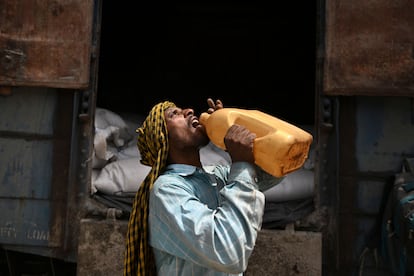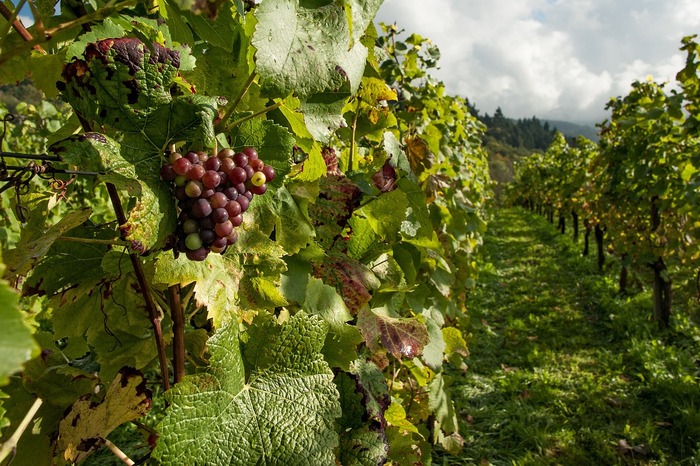An extreme heat wave like the one that the inhabitants of India and Pakistan suffered a few weeks ago may sound exotic and remote, but nothing could be further from the truth.
Because its effects threaten the global supply of wheat, already in check by the invasion of Ukraine.
A study in which 29 international experts have participated concludes that a wave as early, intense and long-lasting as the one experienced in this subcontinent in March and April has been "hotter and more likely" due to the process of climate change that the planet is experiencing due to the human action.
The greenhouse gases expelled by the world economy, still hooked on fossil fuels, accumulate in the atmosphere and generate climate change that makes these extreme weather events more frequent and intense.
The study presented this Monday recalls that the heat wave caused at least 90 deaths in India and Pakistan.
Outside these two countries, the effects will also be felt, because it threatens to increase the global crisis in wheat supply caused by the Russian invasion of Ukraine, one of the world's largest producers of this cereal until the conflict broke out.
Aditi Kapoor, one of the experts who has participated in the study, explains that among the most problematic aspects of this wave is the very early moment in which it occurred, in March and April, when the winter grains are in full growth.
The heat was also joined by some rains well below normal for that time.
Early analyzes point to a 20% drop in wheat yields in India this year due to the heat, adds Kapoor.
Faced with the blockade of exports from Ukraine due to the war, India - which is the world's second largest producer of wheat, although most of its crops are for domestic consumption - had proposed to increase its sales abroad.
But India's plans have gone to waste: on May 13 the Government, concerned about national supplies, banned all wheat exports.
"This is already putting more pressure on world food prices and food security," recalls the international report presented on Monday.
India had calculated before the heat wave that it would be in a position to export up to ten million tons of wheat, "which would have helped to compensate for the deficit caused by the Russian invasion of Ukraine," the study specifies.
In addition, coal shortages in India, also linked to the heat wave, led to power outages that limited access to air conditioning and fans, further aggravating health impacts.
This forced "millions of people" to limit activity to early morning and night to avoid the heat.
The researchers who have carried out this study are part of the World Weather Attribution (WWA), a group of scientists that tries to establish the links between climate change and specific meteorological phenomena.
These types of events, such as heat waves and floods, have always occurred on the planet.
But scientists have been warning for years that climate change acts as fuel and makes them more intense and frequent.
A worker drank water Thursday as he loaded a train with sacks of wheat at a station in Khanna, India.
SAJJAD HUSSAIN (AFP)
That is the general theory.
And the great leap that has been made in recent years in climate science is precisely the attribution of specific phenomena to global warming, thanks to advances in data computation and also to the increase in the number of extreme events.
What is calculated are the probabilities that a specific episode would have occurred if climate change had not existed.
And in the case of the wave in Pakistan and India, warming has made something this extreme about 30 times more likely to happen at that time of year.
This means, according to the WWA report, that such a phenomenon "would have been extraordinarily rare without the effects of human-induced climate change."
In addition, experts have concluded that "the same event would have been approximately one degree Celsius cooler in a pre-industrial climate", that is, before the planet began to warm due to greenhouse gases expelled by the Earth. human activity, as Krishna AchutaRao, another of the study's authors, recalled at a telematic press conference.
Friederike Otto, from Imperial College London and one of the WWA coordinators, explains that a degree in the context of Pakistan and India makes “a huge difference” for the well-being “of human beings and ecosystems”.
March was the hottest in India since records began 122 years ago, recalls WWA, and both this country and Pakistan saw record temperature records.
Furthermore, March was also extremely dry, with 62% less rain than normal in Pakistan and 71% below normal in India.
All this influenced the reduction in the productivity of wheat, which now threatens to push food prices even higher, a huge blow to nations that have fewer economic resources to compete for cereals in international markets.
You can follow CLIMA Y MEDIO AMBIENTE on
and
, or sign up here to receive
our weekly newsletter








/cloudfront-eu-central-1.images.arcpublishing.com/prisa/VPFDJ6LOFBD4DJB77PGQNQCUCE.jpg)
